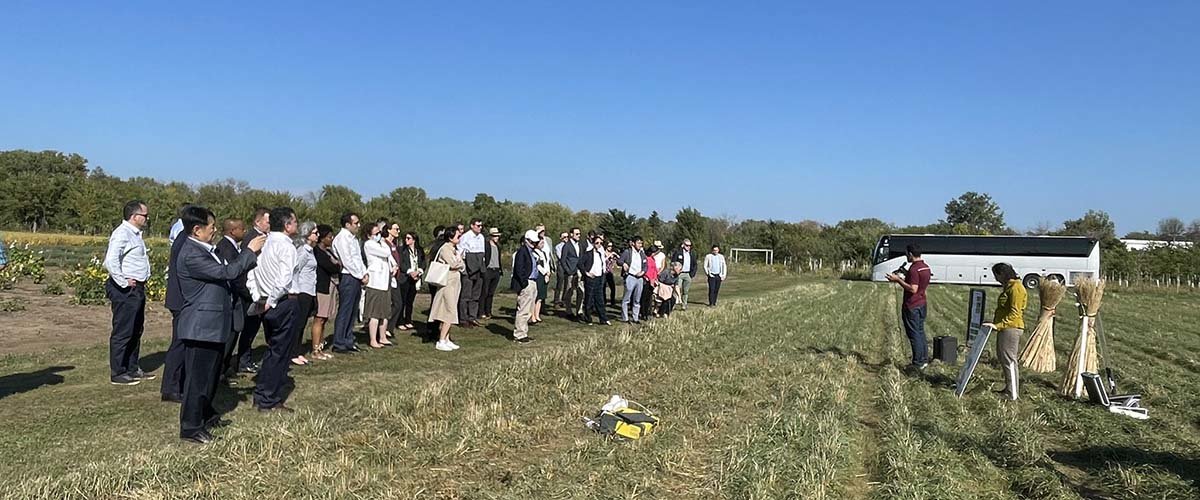
Global attachés visit U of M as part of state ag sector tour
Forever Green Initiative a highlight of USDA Foreign Agricultural Service Minnesota visit

Global agriculture experts visited the University of Minnesota’s College of Food, Agricultural and Natural Resource Sciences (CFANS) on September 19 as part of an annual USDA Foreign Agricultural Service (FAS) state agricultural tour. The FAS links U.S. agriculture to the world to enhance export opportunities and global food security.
With the tour in Minnesota this year, the Minnesota Department of Agriculture (MDA) coordinated with the U of M’s Forever Green Initiative (FGI) to host 30+ attachés who are stationed at foreign embassies in Washington, D.C. for their country to liaise with the U.S. on agricultural issues. FAS staff identify problems, provide practical solutions, and work to advance opportunities for U.S. agriculture and support U.S. foreign policy.
During the visit to the U of M Twin Cities St. Paul campus, they learned about FGI’s focus on high-efficiency agriculture, cropping systems with continuous living cover, and perennial crops.
“It was an honor to host and interact with FAS attachés hailing from Argentina to Australia, Cameroon to Chile, and many other countries,” said Colin Cureton, FGI director of adoption and scaling. “As a leader in the development of continuous living cover crops and systems, the U of M has had the good fortune to be highly collaborative with the USDA, MDA and others in this work. Together, we’re taking the work out into the world via cross-sector partnerships with growers, industry, communities, NGOs, and government. Our visit with the FAS attachés underscores the opportunities we see for international research partnerships and the development of import/export markets for these crops.”
A strong base of evidence indicates that FGI’s production systems will enhance total output of agricultural systems, enable production of new commodities, enhance soils and wildlife, and improve water resources — here in Minnesota and beyond. One example is the first commercially available perennial grain crop in the U.S. — the intermediate wheatgrass KernzaⓇ, which can change agricultural landscapes for the better by providing valuable ecosystem services, reducing input and labor costs, and bringing a new climate-smart commodity to market. During their visit, the attachés heard from Donald Wyse, PhD, FGI co-founder, on the benefits of Kernza as a perennial and drought resistant crop. Wyse was recently featured as an agricultural visionary in a New York Times article titled “Growing a New Future for Farming.”
“New varieties of Kernza grain can enable farmers to grow it profitably at scale and bring its environmental benefits to modern farms and diets,” said Cureton. “We’re very happy to have this unique opportunity to collaborate with representatives from the U.S. government, the MDA, and the international agricultural community right here in the heart of Minnesota,” he said. “By working together, we can make a real difference for the Earth and for people all over the planet.”





